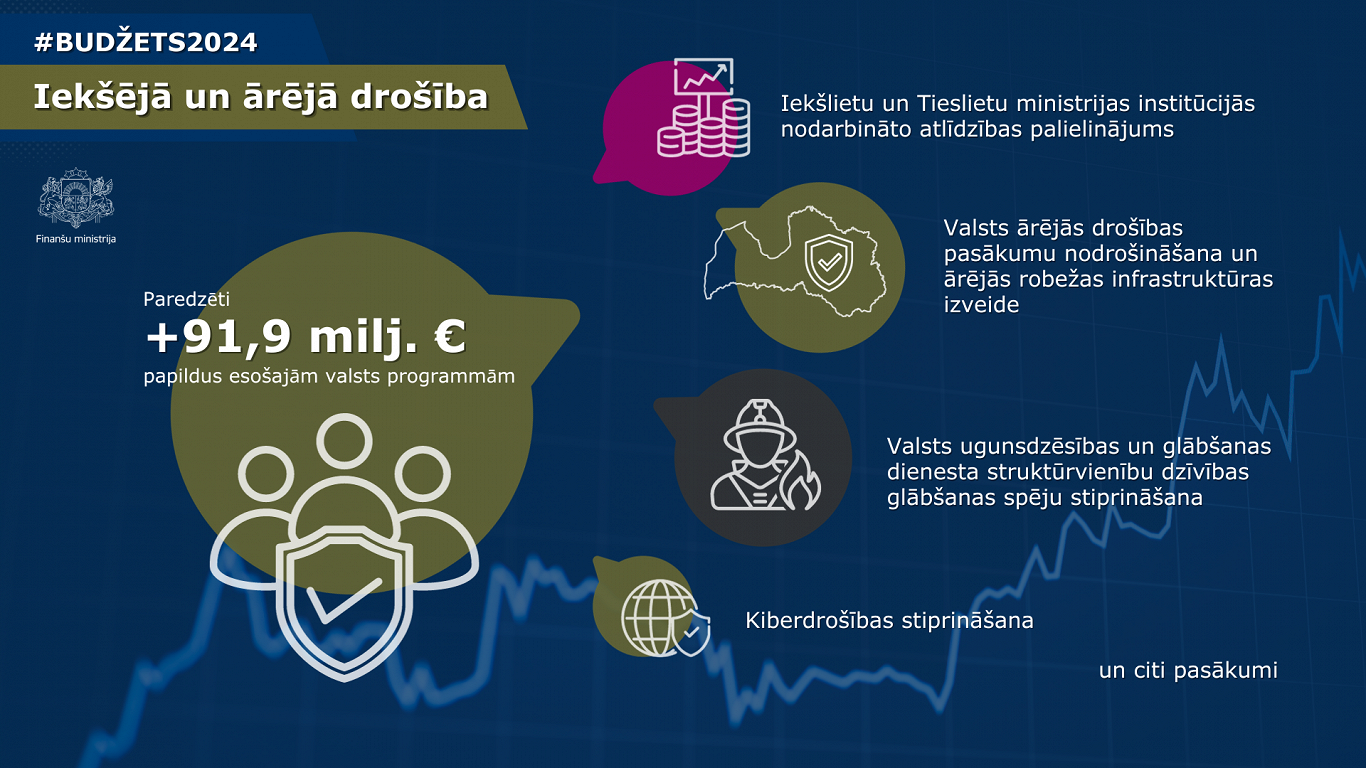The draft budget is drawn up assuming that Latvia's gross domestic product (GDP) will increase by 2.5% next year, while inflation will be 2.9%. Public debt is projected to grow in 2024, from 39.9% of GDP this year to 41% of GDP next year.
The Ministry of Finance noted that both the deficit and debt values are below the reference values of 3% of GDP for the deficit and 60% of GDP for debt set out in the fiscal rules of the European Union.
The revenue of the 2024 consolidated budget is planned to be EUR 14.5 billion, while expenditure – EUR 16.2 billion.
Compared to the 2023 budget, the planned revenue of the State budget in 2024 is expected to be EUR 1.763 billion higher. State budget expenditure in 2024 is planned to be 1.538 billion euros higher than in the State budget of 2023.
The draft law stipulates that the planned revenues in the basic budget amount to 10 billion euros, while expenditures amount to 12.15 billion euros. The increase in state basic budget expenditure compared to the 2023 plan is 1.29 billion euros, or 11.8%, the bill's annotation said.
The total additional support for priorities for 2024 is estimated at EUR 783.7 million, of which EUR 486.4 million is earmarked for the government's national priorities – internal and external security (EUR 91.9 million), education (EUR 119,5 million) and health (EUR 275 million).
An increase of EUR 502 million is foreseen for the implementation of European Union policy instruments and projects and measures co-financed by other foreign financial assistance.
The special budget projects revenues of EUR 4.8 billion, while expenditure of EUR 4.4 billion. The increase in expenditures of the State special budget against the 2023 plan is 272.4 million euro or 6.7%.
Higher wages and border infrastructure
Funding is provided for the increase of remuneration of employees in institutions of the Ministry of Internal Affairs and Ministry of Justice the provision of external security measures of the State and the establishment of external border infrastructure.
There are also means for strengthening cybersecurity, strengthening the life-saving capabilities of State Fire and Rescue Service units, and other measures. in 2027, it is planned to reach the amount of financing for national defense in the amount of 3% of gross domestic product.
In the field of education, the most significant funding is for the next step of implementation of the teachers' pay growth schedule from January 1, 2024.
Additional funding for access to reimbursable medicinal products, including new medicinal products, is provided for health care in the State budget 2024. Additional budget funds will be invested in cardiovascular health, support for oncology patients, and access to dental services for children. Next year, medical salaries will also continue to be raised, the FM said.
Tax changes
The budget bill includes a number of tax changes:
- setting the annual corporate income tax surcharge at 20% for credit institutions and consumer credit service providers;
- non-application of corporate tax to operating expenses arising from the use of representative cars registered in the holding or possession of the company for more than 60 months;
- the amount of compensation of the employer not subject to payroll taxes has been increased for expenses of the employee in relation to remote work (up to 40 euros per month);
- raising the personal income tax exemption threshold for the amounts of health and accident insurance premiums (up to EUR 750 per year);
- application of the personal income tax relief and the non-taxable minimum also to micro-enterprise taxpayers if the person simultaneously generates income taxed at the progressive tax rate;
- extension of the duration of the special tax scheme for non-registered royalty recipients and determination of a flat rate;
- setting a flat rate of 25% for micro-enterprise tax;
- raising gambling tax rates;
- raising the threshold for registration of value-added tax (VAT) in the VAT register of the State Revenue Service to EUR 50 000, setting the threshold for the value of lost debts to EUR 1 000, application of the VAT exemption for sports activities, revision of the limit for deduction of input tax in respect of expenses for representative cars;
- changes in natural resources tax rates, new tax objects, cancellation of relief, and changes in distributions between State and local government budgets;
- increase of excise duty rates for tobacco products, e-liquids, tobacco substitute products, alcoholic beverages and diesel and petroleum used in special economic zones and free ports.
The minimum wage will rise to €700 a month from 2024, according to previous decisions.
Finance Minister Arvils Ašeradens (New Unity) told Latvian Radio in an interview that next year's state budget is the government's and society's answer to geopolitical events. The minister called next year's state budget a “security and sustainability budget.”
Aseraden emphasized that next year's priority will be additional spending on security, as well as a previously unprecedented money supplement for the education and health sectors.
The Minister said that there are also unfinished things in the budget, for example, no decision has been taken to apply a 12% reduced VAT rate to fruits and vegetables grown in Latvia. In order to be able to determine the rate in the planned reduced amount of 12%, the budget will need to find EUR 16 million and will probably do so in the Saeima at work with the budget, the minister said at a press conference after the meeting of the government.
Similarly, Ašeradens believes not enough funds have been found for “those people working at the border and interior services”, as well as the FM continues to address the lack of funding for municipalities where the provision of basic needs is at risk next year.





























